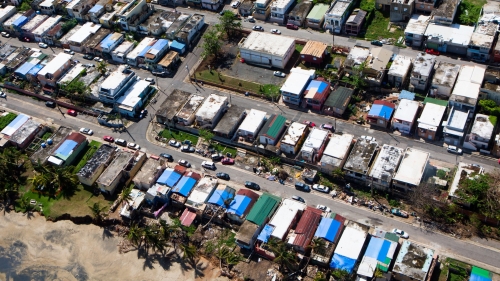Today marks 75 days since Hurricane Maria hit my home island of Puerto Rico. I just returned last night from visiting and much of the island looks as if the storm hit yesterday, while other parts appear relatively untouched. The devastation began to hit me as the plane landed, and I saw a sea of blue roofs, or tarps, covering damaged buildings and homes. I saw piles of rubble where some structures crumbled and quite starkly, I saw empty beaches and few people on the shoreline.

Puerto Rico and the U.S. Virgin Islands are healing. Rebuilding. Recovering. Making tough choices. The airports are emotional places where goodbyes seem to linger longer than usual and faces seem blanketed with worry and anxiety. I drove from the capital of San Juan to my town of Cabo Rojo in the Southwest of the island and one of the images that stood out the most to me were the uprooted trees.
The island looks lush and green—much more so than when I was last there in July when there were signs of drought. However, when one looks closely, one sees how many of those green trees are uprooted out of the ground, leaning over, fallen, and in many cases entangled in power lines. Highway signs unearthed from the ground—cement foundations intact—toppled over and mangled. Their metal looks like a crumpled piece of paper. It was 67 days before my family got power back. Then on day 68 we lost it again. It returned day 70. We anticipate this will continue moving forward as the power grid was already unstable pre-storm. The water is some of the most toxic in the country, and you must be very careful not to drink it or let it contact open cuts and wounds.
On the highway, there was a sign that said, “El dolor de hoy será la fuerza de mañana.” Today’s pain will be the strength of tomorrow. This rings so true for my people and yours, the people of Puerto Rico, our fellow American citizens. Despite the inequitable distribution of resources by our federal government, the lack of attention to the ongoing humanitarian crisis, and the racist, colonized relationship through which American blames Puerto Ricans for financial troubles fueled by its positionality as a commonwealth (read: possession) of this country, mi gente are resilient. They remain positive and hopeful.

